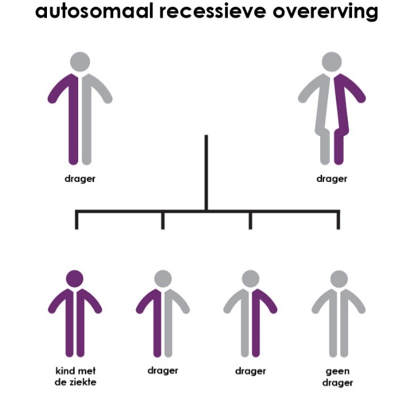How does someone get MPS I?
MPS I is hereditary
People inherit two copies of each gene, one from each parent. The genes contain information about our genetic material, for example physical characteristics such as the color of the eyes or body height. All genes that a person inherits are accommodated in 23 pairs of chromosomes. Each chromosome contains thousands of genes.
Every person has an estimated 8 to 10 modified (mutated) genes. Some mutations of genes do not have a major impact, but other mutations can cause illness. Like normal genes, mutated genes can be passed on from one generation to another. For more information about heredity, go to understanding genetic diseases.
The genes for the production of the enzyme alpha-L-iduronidase are transferred by the parents to their children. In MPS I the blueprint for this enzyme shows defects; consequently, the enzyme alpha-L-iduronidase cannot function normally.
Men and women have the same risk
Copies of the alpha-L-iduronidase gene are carried by a chromosome that does not determine the sex of an individual. People normally have 46 chromosomes, including the two that determine sex (either 2 "X" chromosomes in women, or an "X" and a "Y" chromosome in men). The other 22 pairs of chromosomes are called "autosomes". The gene for the enzyme alpha-L-iduronidase is carried by one of the autosomal chromosome pairs. MPS I is therefore an autosomal recessive disorder. "Recessive" means that an individual must inherit two mutated copies of the gene, ie one from each parent, to develop the disease.
Who is a carrier of MPS I?
A person with one defective gene and one normal gene for alpha-L-iduronidase is carrier of MPS I. Carriers do not get the disease themselves because one of their two genes for alpha-L-iduronidase is normal, so that enough enzyme is produced to prevent GAGs from accumulating. Although carriers of MPS I show no symptoms of the disease, the probability that they pass the "MPS I gene" to one of their children is 50:50.
What is the chance of having children who are suffering from MPS I or who are carriers?
When both parents have normal genes for alpha-L-iduronidase, their children inherit two normal genes, one from each parent. When both parents suffer from MPS I, all their children inherit the two "MPS I genes" and consequently also the disease.
A child of which only one parent is a carrier has a 50% chance of becoming a carrier. If both parents are carriers of MPS I, there is a 50% chance of the child inheriting one MPS I gene from each parent and carrier, or a risk of 25% that it will actually receive MPS I. This means that parents who are carriers with every pregnancy have a 3 in 4 (75%) chance of having a child that is unaffected.
With every pregnancy, the chance to inherit MPS I is completely independent of whether a previous child is suffering from the disease or not. When a child is suffering from MPS I it does not mean that the next child cannot inherit the disease. It does not mean that the next child will have the disease.
If only one parent suffers from MPS I and the other parent does not have the disease and is not a carrier, all children will inherit the MPS I gene from the parent who suffers from the condition and become a carrier. However, none of the children will get the disease.
If one of the parents suffers from MPS I and the other parent carries MPS I, then there is a 50% chance of having a child who inherits an "MPS I gene" from each parent and thus receives the disease. There is also a 50% chance of a child who inherits the "MPS I gene" from only one parent and becomes a carrier.
Is there a test to detect the heredity of MPS I?
Since MPS I is a genetic disorder, all descendants of people with MPS I run the risk of developing the disease, or they are potential carriers of the "MPS I gene". Families with a history of MPS I can discuss the possibility of a genetic test with their doctor. A blood test can show whether a person is suffering from MPS I or is a carrier. Prenatal testing for MPS I can also be performed early in the pregnancy. Couples who are carriers or who have a history of MPS I in the family can also rely on genetic advice.



